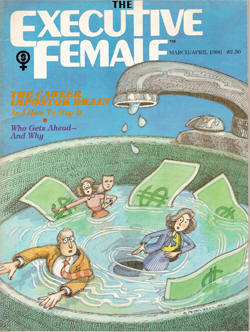There’s been lots of buzz lately about the term impostor “syndrome.”
I don’t mean buzz about the actual experience of believing we’ve fool others into thinking we’re more intelligent, capable, or talented as others “know” ourselves to be.
What I’m referring to is the buzz about popular use of the term impostor syndrome to describe what was originally referred to as the impostor phenomenon.
Buzz is probably the wrong word. If you’re a psychologist a better word might be aggravation. After all, in their world, syndrome refers to a mental disease or disorder.
Or if you’re Suzanne Imes, who, along with fellow clinical psychologist Pauline Clance co-coined the term impostor phenomenon 45 years ago, an even more apt word may be exasperation.
In a recent New Yorker article Imes was paraphrased as saying, every time she hears the phrase “impostor syndrome,” it lodges in her gut, adding that it is technically incorrect and conceptually misleading.
A few months earlier I conducted a lengthy interview with Suzanne of my own.
I wanted to know more about her background, how she and Pauline met, about the observational nature of their work as well as the 178 women they included in their initial sample.
I also wanted to hear her response to the ways in which their work has been misrepresented to include accusing them of deliberately leaving out women of color or of failing to recognize how the external reality of sexism might contribute to the internal experience of impostorism. But I’ll save that for another day.
I mention this interview because at the end Suzanne flat out asked if I could “help people to start calling it the impostor phenomenon,” adding, “Somebody as influential as you could really help.”
That was a tricky one for me.
After all, her and Clance’s work has had a tremendous impact on my life personally and professionally. An impact that began in 1981 when I came across their paper as a young first-generation student in a doctoral program. To suddenly have a name for these nebulous feelings of being way over my head — and to find out others felt the same — was both liberating and perplexing.
Indeed, their 1978 paper, The impostor phenomenon among high achieving women, was the impetus for switching my doctoral research from an examination of white racism to trying to understand why so many bright, capable women (who were the focus at that time) felt anything but.
All this is to say, I have nothing but respect and admiration for their work. So much so that I dedicated my book to them.
Which is why when Suzanne asked me to do something about the problematic terminology, I tried to be at once sympathetic to her concern but non-committal as to what I was being asked to do.
It was around this same time University of Michigan psychology professor Kevin Cokley asked me to contribute a chapter to an upcoming book he’s editing on the impostor phenomenon.
To say I was surprised at an invitation to contribute to a book being published by the American Psychological Association would be an understatement.
Unlike the other contributors and the intended readership, I’m neither a psychologist nor an academic. I’m an educator who in 1983 used the findings of my doctoral research to design an educational intervention to impostor syndrome which I’ve delivered to hundreds of thousands of people around the world.
I already knew I’d be the outlier in this book. But to use the term impostor SYNDROME where literally everyone else will use impostor PHENOMENON? Yikes!
I can say with total certainty that I’ve never considered my own or others impostor feelings as any sort of psychological disorder.
Other than that, I honestly have no clue why I began to use impostor syndrome. But I was suddenly curious about the evolution of this shift. So I contacted the reference staff at the US Library of Congress in 2022 to help find the answer.

Some History
That’s when I learned that a lot of research from the late 1970s and early ‘80s has not been digitized.
The earliest searchable use of impostor syndrome they could find was from 1981 — just three years after Clance and Imes original paper.
Not surprisingly the term appeared in the popular women’s magazine Vogue. But “impostor syndrome” also appeared early in academic writings.
Among them in an abstract from a 1981 publication on college personnel, a 1983 report by the Center for Research on Women in Science at Morris Brown college and sponsored by the then National Institute of Education titled “Factors influencing the persistence/achievement among Black high school and college women in the sciences and health professions,” and in a 1984 peer reviewed paper titled, Power and Authority in the Classroom: Sexist Stereotypes in Teaching Evaluations by Elaine Martin published by the University of Chicago Press.
A year later I used the term in my dissertation to talk about Clance and Imes findings. It never once occurred to me that we weren’t describing the same thing.
My dissertation would not be officially published until 1985. But by fall 1983 I’d gathered enough data to form the basis of what was likely the first workshop on impostor syndrome which I co-facilitated with friend and colleague, Dr. Lee Ann Bell.
Although Lee and I certainly talked about impostor syndrome in the workshop itself, it was not part of the title. Instead it was called Impostors, Fakes, and Frauds: Issues of Competence and Confidence for Women.
My first public usage was in a 1986 cover article I wrote for Executive Female magazine on the organizational sources — and costs — of impostor syndrome.

I bought the domain impostorsyndrome.com in 1995.
I used the term in the subtitle of my 2011 book, The Secret Thoughts of Successful Women: Why Capable People Suffer from Impostor Syndrome and How to Thrive in Spite of It (Random House).
And for the past decade I’ve been facilitating and more recently licensing independent speakers as well as internal learning and development professionals to deliver a solutions-oriented, non-therapy based program I created called Rethinking Impostor Syndrome™.
Last I checked, there were 4.5 million Google searches for impostor syndrome, nearly three times that (11,800,000) for impostER syndrome (oddly, both spellings are correct). In comparison, just over 2 million searched for “phenomenon.”
For better or worse, impostor syndrome has become the prevailing term in popular discourse.
The question is why.
We’ll never know for sure of course. But the explanation for this linguistic shift may be as simple as one’s literal source of reference.
For clinicians that source is the Diagnostic and Statistical Manual of Mental Health (DSM). There “syndrome” refers to a mental disease or disorder.
However, for those of us outside of psychology the defining source is not the DSM but rather the dictionary.
Merriam-Webster Dictionary cites two definitions. The first is clinical and contains terms like symptoms, abnormality, and condition.
However, the second — and equally valid — meaning is, “a set of concurrent things (such as emotions and actions) that usually form an identifiable pattern.”
In other words, it’s reasonable to assume the term syndrome emerged not to imply any sort of psychological disorder, but as a valid alternative to describe the thoughts, feelings, and behaviors commonly associated with the impostor experience.
Which means unless you’re providing therapy (I’m not), then impostor syndrome is, in my view, only “technically incorrect” if you are in the field of psychology. And it’s only conceptually misleading if you fail to make clear — as I’ve always done — that impostor syndrome/phenomenon is not a mental disease or disorder of any kind.
Still I’ve become increasingly sensitive to how for some the term impostor syndrome is the linguistic equivalent of nails on a chalkboard.
Which is why I gave serious consideration to changing my vocabulary both in the APA book and per Suzanne’s plea, in my own work.
In the end however, I decided it would be disingenuous for me to stray from a term I and others have used responsibly for four decades.
The relationship between Shakespeare’s Romeo and Juliet is doomed for no other reason than they bore the names of enemy families. To which Juliet famously asks her beloved “What’s in a name?” Just as a rose by any other name would smell as sweet, in the end, a name is not what matters most.
When you’re the one with that, “I’m in over my head and they’re going to find out” feeling, would the angst be any less if it was called one thing or another?
So let’s all take a deep breath. Because whether you call it the impostor phenomenon or syndrome, the result is the same. Everyone loses when bright people play small.



